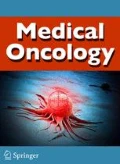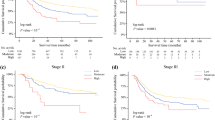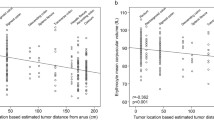Abstract
Anemia is a common complication in several types of cancer including hepatocellular carcinoma (HCC). The prognostic potential of hemoglobin (Hb) levels has not yet been investigated in HCC patients. One hundred and ninety-nine patients were prospectively recruited and Hb levels were determined. Hb levels were compared to the stages of liver cirrhosis and HCC stages. The association of the Hb levels and overall survival (OS) was assessed by univariate and multivariate Cox regression models. The relation of Hb levels and OS was further validated in an independent cohort of 87 HCC patients. Hb levels negatively correlated with the stage of liver cirrhosis (model of end stage liver disease score and Child-Pugh stage) and differed between stages of HCC. Low Hb levels (≤13 g/dl) were associated with higher mortality in the test [hazard ratio (HR) 2.422, 95 % confidence interval (CI) 1.357–4.322, P = 0.003] as well in the validation cohort (HR 2.486, 95 % CI 1.097–5.632, P = 0.029) in univariate Cox regression model. Low Hb levels were associated with mortality independently from the tumor stage, age, gender and the C-reactive protein levels in a multivariate Cox regression model. Anemia should be considered as a risk factor for mortality in HCC patients.



Similar content being viewed by others
References
El-Serag HB. Hepatocellular carcinoma. N Engl J Med. 2011;365:1118–27.
Welzel TM, Graubard BI, Zeuzem S, El-Serag HB, Davila JA, McGlynn KA. Metabolic syndrome increases the risk of primary liver cancer in the United States: a study in the SEER-medicare database. Hepatology. 2011;54:463–71.
EASL-EORTC clinical practice guidelines: management of hepatocellular carcinoma. J Hepatol. 2012;56:908–43.
Mazzaferro V, Regalia E, Doci R, Andreola S, Pulvirenti A, Bozzetti F, et al. Liver transplantation for the treatment of small hepatocellular carcinomas in patients with cirrhosis. N Engl J Med. 1996;334:693–9.
WHO. Worldwide prevalence of anemia 1993–2005: WHO global database on anemia. Geneva: World Health Organization; 2008.
WHO. Iron deficiency anemia assessment, prevention, and control. A guide for programme managers. Geneva: World Health Organisation; 2001.
Knight K, Wade S, Balducci L. Prevalence and outcomes of anemia in cancer: a systematic review of the literature. Am J Med. 2004;116:11S–26S.
Littlewood TJ. The impact of hemoglobin levels on treatment outcomes in patients with cancer. Semin Oncol. 2001;28:49–53.
Demetri GD, Kris M, Wade J, Degos L, Cella D. Quality-of-life benefit in chemotherapy patients treated with epoetin alfa on hematologic parameters is independent of disease response or tumor type: results from a prospective community oncology study. Procrit study group. J Clin Oncol. 1998;16:3412–25.
Lee WR, Berkey B, Marcial V, Fu KK, Cooper JS, Vikram B, et al. Anemia is associated with decreased survival and increased locoregional failure in patients with locally advanced head and neck carcinoma: a secondary analysis of RTOG 85-27. Int J Radiat Oncol Biol Phys. 1998;42:1069–75.
Moullet I, Salles G, Ketterer N, Dumontet C, Bouafia F, Neidhart-Berard EM, et al. Frequency and significance of anemia in non-Hodgkin’s lymphoma patients. Ann Oncol. 1998;9:1109–15.
Lutterbach J, Guttenberger R. Anemia is associated with decreased local control of surgically treated squamous cell carcinomas of the glottic larynx. Int J Radiat Oncol Biol Phys. 2000;48:1345–50.
Mercadante S, Gebbia V, Marrazzo A, Filosto S. Anemia in cancer: pathophysiology and treatment. Cancer Treat Rev. 2000;26:303–11.
Mikami Y, Mikami M, Nannmoku H, Kawashima H, Sasaki T, Hada R, Inoue S. Anemia-inducing factor expressed in gastric cancer is homologous with complement regulatory factor CD59. J Exp Clin Cancer Res. 1998;17:355–60.
Means RT, Krantz SB. Progress in understanding the pathogenesis of the anemia in chronic disease. Blood. 1992;80:1639–47.
Faquin WC, Schneider TJ, Goldberg MA. Effect of inflammatory cytokines on hypoxia-induced erythropoietin production. Blood. 1992;79:1987–94.
Henry DH. Changing patterns of care in the management of anemia. Semin Oncol. 1992;19:3–7.
Frenkel EP, Bick RL, Rutherford CJ. Anemia of malignancy. Hematol Oncol Clin North Am. 1996;10:861–73.
McShane LM, Altman DG, Sauerbrei W, Taube SE, Gion M, Clark GM. Statistics subcommittee of the NCI-EORTC working group on cancer diagnostics. Reporting recommendations for tumor marker prognostic studies (REMARK). J Natl Cancer Inst. 2005;97:1180–4.
Llovet JM, Di Bisceglie AM, Bruix J, Kramer BS, Lencioni R, Zhu AX, et al. Panel of experts in HCC-design clinical trials. Design and endpoints of clinical trials in hepatocellular carcinoma. J Natl Cancer Inst. 2008;100:698–711.
A new prognostic system for hepatocellular carcinoma: a retrospective study of 435 patients: the Cancer of the Liver Italian Program (CLIP) investigators. Hepatology. 1998;28:751–5.
Llovet JM, Brú C, Bruix J. Prognosis of hepatocellular carcinoma: the BCLC staging classification. Semin Liver Dis. 1999;19:329–38.
Kamath PS, Wiesner RH, Malinchoc M, Kremers W, Therneau TM, Kosberg CL, et al. A model to predict survival in patients with end-stage liver disease. Hepatology. 2001;33:464–70.
Glaspy J, Bukowski R, Steinberg D, Taylor C, Tchekmedyian S, Vadhan-Raj S. Impact of therapy with epoetin alfa on clinical outcomes in patients with nonmyeloid malignancies during cancer chemotherapy in community oncology practice. Procrit study group. J Clin Oncol. 1997;15:1218–34.
Demetri GD, Kris M, Wade J, Degos L, Cella D. Quality-of-life benefit in chemotherapy patients treated with epoetin alfa is independent of disease response or tumor type: results from a prospective community oncology study. Procrit study group. J Clin Oncol. 1998;16:3412–25.
Littlewood TJ, Bajetta E, Nortier JW, Vercammen E, Rapoport B; Epoetin Alfa Study Group. Effects of epoetin alfa on hematologic parameters and quality of life in cancer patients receiving nonplatinum chemotherapy: results of a randomized, double-blind, placebo-controlled trial. J Clin Oncol. 2001;19:2865–74.
Kelleher DK, Mattheinsen U, Thews O, Vaupel P. Blood flow, oxygenation and bioenergetic status of tumors after erythropoietin treatment in normal and anemic rats. Cancer Res. 1996;56:4728–34.
Wenger RH. Cellular adaptation to hypoxia: O2-sensing protein hydroxylases, hypoxia-inducible transcription factors, and O2-regulated gene expression. FASEB J. 2002;16:1151–62.
Tsai YP, Wu KJ. Hypoxia-regulated target genes implicated in tumor metastasis. J Biomed Sci. 2012;19:102.
Teicher BA, Holden SA, al-Achi A, Herman TS. Classification of antineoplastic treatments by their differential toxicity toward putative oxygenated and hypoxic tumor subpopulations in vivo in the FSaIIC murine fibrosarcoma. Cancer Res. 1990;50:3339–44.
Van Belle SJ, Cocquyt V. Impact of haemoglobin levels on the outcome of cancers treated with chemotherapy. Crit Rev Oncol Hematol. 2003;47:1–11.
Harrison LB, Chadha M, Hill RJ, Hu K, Shasha D. Impact of tumor hypoxia and anemia on radiation therapy outcomes. Oncologist. 2002;7:492–508.
Choi Y, Park B, Kim K, Jeong BC, Seo SI, Jeon SS, et al. Erythrocyte sedimentation rate and anaemia are independent predictors of survival in patients with clear cell renal cell carcinoma. Br J Cancer. 2013;108:387–94.
Caro JJ, Salas M, Ward A, Goss G. Anemia as an independent prognostic factor for survival in patients with cancer: a systemic, quantitative review. Cancer. 2001;91:2214–21.
Goodnough LT, Brecher ME, Kanter MH, AuBuchon JP. Transfusion medicine. First of two parts-blood transfusion. N Engl J Med. 1999;340:438–47.
Villanueva C, Colomo A, Bosch A, Concepción M, Hernandez-Gea V, Aracil C, et al. Transfusion strategies for acute upper gastrointestinal bleeding. N Engl J Med. 2013;368:11–21.
Schrijvers D, De Samblanx H, Roila F; ESMO Guidelines Working Group. Erythropoiesis-stimulating agents in the treatment of anaemia in cancer patients: ESMO clinical practice guidelines for use. Ann Oncol. 2010;21:v244–7.
Bohlius J, Schmidlin K, Brillant C, Schwarzer G, Trelle S, Seidenfeld J, et al. Recombinant human erythropoiesis-stimulating agents and mortality in patients with cancer: a meta-analysis of randomised trials. Lancet. 2009;373:1532–42.
Mathurin SA, Agüero AP, Dascani NA, Prestera JA, Gianserra C, Londero E, Chiorra C. Anemia in hospitalized patients with cirrhosis: prevalence, clinical relevance and predictive factors. Acta Gastroenterol Latinoam. 2009;39:103–11.
Qamar AA, Grace ND, Groszmann RJ, Garcia-Tsao G, Bosch J, Burroughs AK, et al. Incidence, prevalence, and clinical significance of abnormal hematologic indices in compensated cirrhosis. Clin Gastroenterol Hepatol. 2009;7:689–95.
Aapro M, Österborg A, Gascón P, Ludwig H, Beguin Y. Prevalence and management of cancer-related anaemia, iron deficiency and the specific role of i.v. iron. Ann Oncol. 2012;23:1954–62.
Dicato M, Plawny L, Diederich M. Anemia in cancer. Ann Oncol. 2010;21(vii167-7):2.
Waidmann O, Brunner F, Herrmann E, Zeuzem S, Piiper A, Kronenberger B. Macrophage activation is a prognostic parameter for variceal bleeding and overall survival in patients with liver cirrhosis. J Hepatol. 2013;58:956–61.
Cervoni J, Thévenot T, Weil D, Muel E, Barbot O, Sheppard F, et al. C-reactive protein predicts short-term mortality in patients with cirrhosis. J Hepatol. 2012;56:1299–304.
Sieghart W, Pinter M, Hucke F, Graziadei I, Schöniger-Hekele M, Müller C, et al. A single determination of C-reactive protein at the time of diagnosis predicts long term outcome of patients with hepatocellular carcinoma. Hepatology. 2013;57:2224–34.
Waidmann O, Köberle V, Bettinger D, Trojan J, Zeuzem S, Schultheiß M, et al. Diagnostic and prognostic significance of cell death and macrophage activation markers in patients with hepatocellular carcinoma. J Hepatol. 2013;59:769–79.
Acknowledgments
We thank Friederike Brunner and Martin-Walter Welker for recruiting study participants.
Conflict of interest
The authors state that they have nothing to disclose.
Author information
Authors and Affiliations
Corresponding author
Rights and permissions
About this article
Cite this article
Finkelmeier, F., Bettinger, D., Köberle, V. et al. Single measurement of hemoglobin predicts outcome of HCC patients. Med Oncol 31, 806 (2014). https://doi.org/10.1007/s12032-013-0806-2
Received:
Accepted:
Published:
DOI: https://doi.org/10.1007/s12032-013-0806-2




